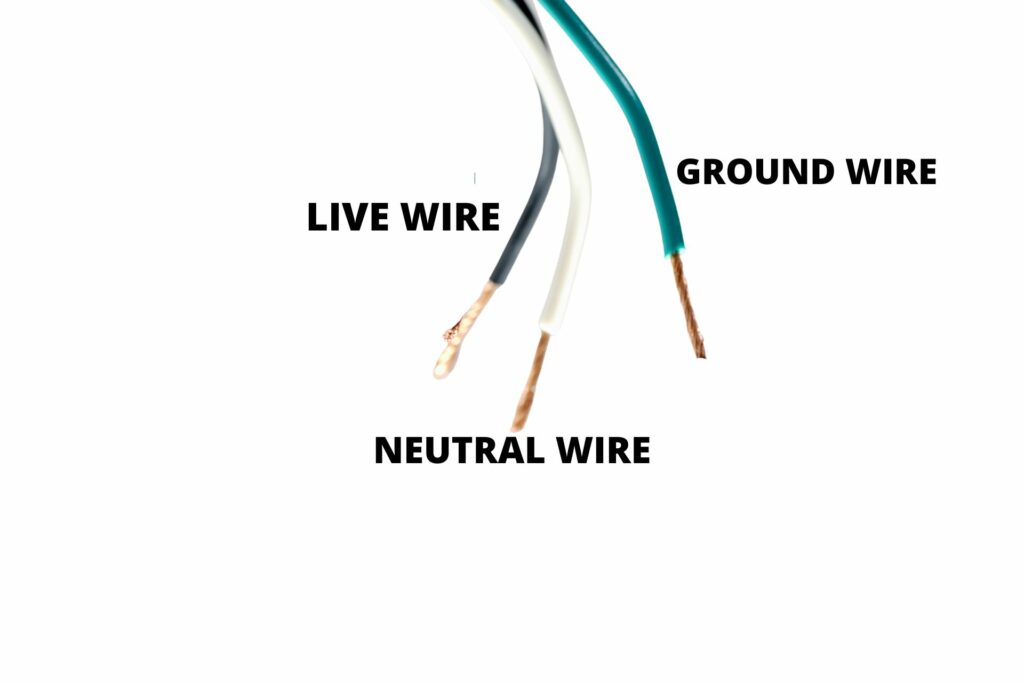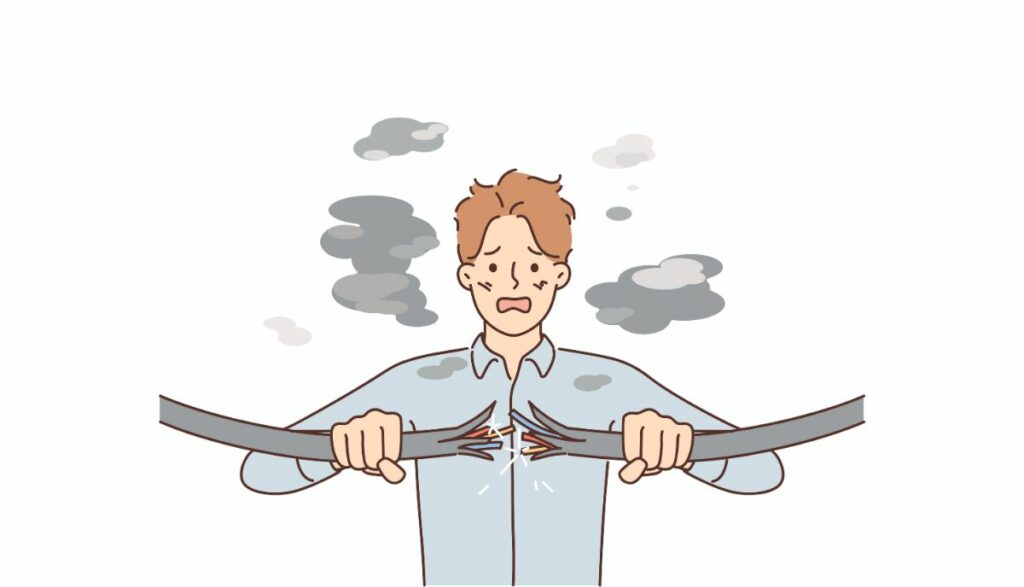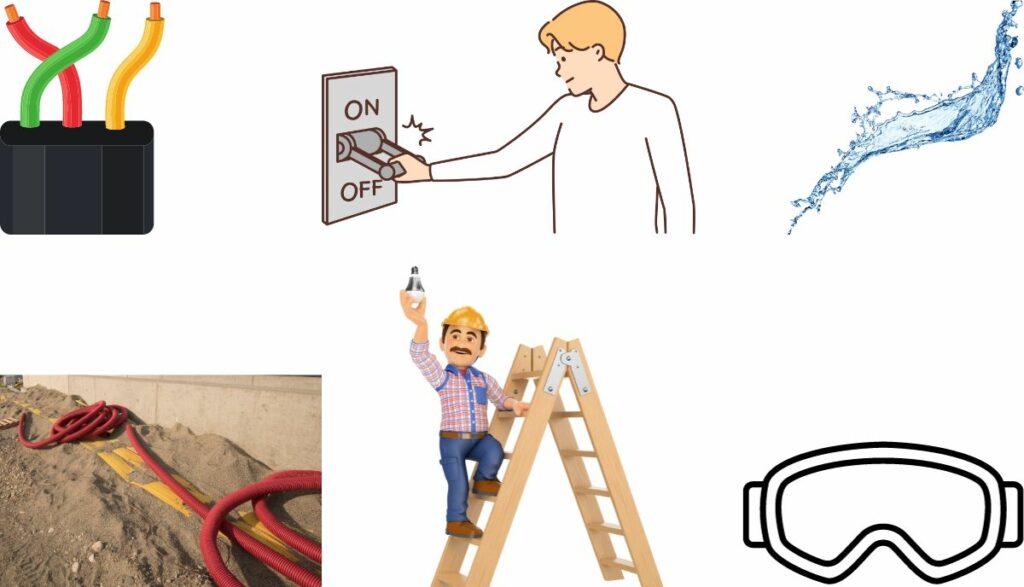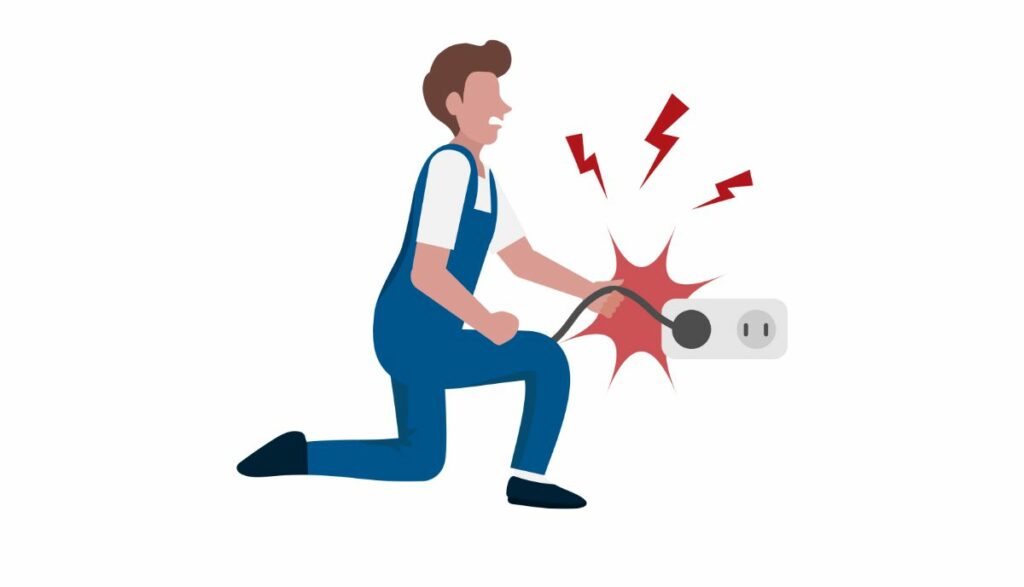Touching one wire can cause an electric shock if you complete a circuit by touching the ground simultaneously. Severity depends on voltage, current, and body resistance. Safety precautions are crucial.
According to the Electronic Library of Construction Occupational Safety and Health, electrocution occurs when a current runs through your body. They’ve also clarified that a current moves when you connect two wires at different voltages.
But is that true? How does that apply to someone who touches a single wire? This is what you should know:
1). How A Current Moves?
- Circuits have a live, neutral, and earth wire.

- The live wire has a high electrical potential. The neutral has little or no electrical potential. This is also true for the ground wire.
- The current will move from a high potential to a low one. This is why it flows from the panel through the live wire to the appliance and back to the panel via the neutral. The live wire’s high potential and the neutral’s low potential make the electrical flow possible.
- If you touch one wire with a higher potential and another wire with a low potential, the current will flow from the higher potential through your body to the lower potential.
2). How Does A Current Moves With One Wire?
- The concept highlighted above (that a current needs two points of varying potential to move) is correct. But that raises a question. Have you noticed that a bird can stand on a high-voltage wire without sustaining injuries? How does that happen?
- The bird is touching the circuit at a single point. Stepping on the wire with two feet only counts as one point of contact. The current won’t flow because the circuit is not complete. Keep in mind that voltage compels the current to move through a conductor. But the voltage does not exist at a point. You measure the voltage between two points.
- Does that mean a human can escape electrocution by touching one wire? Not necessarily. Your home’s electrical system is connected to the ground. If you hold a live wire while touching the ground, you have completed the circuit by making contact at two different points. The current will flow from the conductor through your body to the ground.

- Let’s check a diagram showing the relationship between a bird, a human being, and an electrical circuit. You can see that the human is touching two points (the high-voltage wire above and the ground below). That difference in potential makes electrocution a possibility.
3). What If You Wear Rubber Shoes?

Theoretically, you can safely interact with a live wire if you avoid direct contact with the ground or other conductors. Rubber shoes can insulate you from the ground. But the practice is dangerous. What if you slip and touch the wall with your other hand?
What if you’re wearing conventional shoes with thin soles that don’t provide sufficient insulation? What if your rubber shoes have a nail or metal studs? Don’t take the risk.
What Factors Determine The Severity Of An Electric Shock When Touching A Wire?
Why do some people survive electrocution without a scratch while others die? The following variables will affect the severity of an electric shock:
1). Duration Of Contact

It only takes a fraction of a second for a shock to kill you, especially if the current crosses your heart. However, the shorter the duration of contact, the higher your chances of surviving. The longer the period of contact, the more damage the current will do.
2). Current and Voltage
Metroid Electrical Engineering has found that 0.007 amps can kill you if they cross your heart for three seconds. As for the voltage, 50V can send a lethal current through you.
3). Frequency of the Current
According to this paper from Stat Pearls Publishing, frequencies of 40Hz – 110 Hz (which is where you find household currents) will cause the muscles to contract, forcing you to maintain a hold on the live wire.
4). Path Of The Current
You’re more likely to survive electrical currents that don’t pass through the chest. Currents that cross the heart can disrupt the heart’s rhythm.
5). The Body’s Resistance
A higher resistance reduces the current flowing through your body. Dry skin has a high resistance. Sweat will lower the resistance. The IEEE Standards Association has a thorough breakdown of the human body’s resistance under different settings. It also details safe exposure levels concerning electricity and electromagnetic fields.
But if you don’t have the time to analyze the extensive document, Electrical Terminology has a table from IEEE Standard 1048 (1990) that shows the body’s resistance in Ohms and the suggested values for each body part.
Are There Safety Measures That Can Reduce The Risk Of Electric Shock When Working With Wires?

Just because you’re handling live wires doesn’t mean you’re guaranteed to receive a shock. Take the following precautions:
- Stick to well-insulated cables. Damaged wiring is dangerous because the exposed conductors are more likely to shock you if you touch them with bare hands. Some people cover the tears with insulation tape, but you’re better off replacing damaged wiring.
- Pull wires in rugged environments through conduits to protect them. Use insulated tubes to prevent laypeople in the vicinity from accidentally touching exposed conductors.
- Stay away from water while handling energized conductors. Dry your hands. Otherwise, the moisture will lower your resistance.
- Use the main breaker to kill the power before you touch electrical wires.
- Buy insulated tools.
- Wear protective equipment (Goggles and gloves).
- Use wooden, fiberglass, and bamboo instead of steel and aluminum ladders.
Are There Differences In Electric Shock Risk Between Alternating Current (AC) And Direct Current (DC) Wires?
- You can expect a shock from both Alternating Current and Direct Current.
- AC has numerous ways of entering and exiting your body (without a closed loop) because the voltage alternates.
- You can easily step up AC to higher voltages. DC requires complex setups to achieve a similar outcome.
- While they can both cause muscular contractions, AC can induce them at a much smaller magnitude.
- All-About-Circuits agrees that low-frequency AC creates extended muscle contractions. On the other hand, they associate DC with a single convulsive contraction.
- It’s worth noting that cardioverts and defibrillators usually rely on DC.
What Actions Should Be Taken In The Event Of An Electric Shock From A Wire?

- Is the person touching the live wire? Kill the power at the breaker. If they’ve made contact with an appliance, pull the plug from the wall socket.
- If the breaker is too far or inaccessible, break the victim’s contact with the power source by standing on a rubber mat, book, or any other insulating material and using a wooden broom to push the person away from the power source. Don’t touch the victim with your bare hands or a conductive object.
- Determine the victim’s responsiveness by asking for their name, pinching the ear, and tapping them on the shoulders.
- If the victim is unresponsive, lift the chin and tilt the head back to open the airway. This means rolling the victim on their back.
- Check their breathing. Is the chest rising and falling? Do you hear breathing sounds? Do you see obstructions in the mouth?
- Call emergency services if the victim has stopped breathing and begin chest compressions.
- Try to stay on the line with emergency services. The operator may offer guidance.
- Remove clothes and jewelry from burns and cool them with cold water.
If the victim seems unaffected by the shock, keep an eye on them. According to Medical News Today, cardiac abnormalities are unlikely to manifest if you don’t notice the symptoms within the first 48 hours. Nonetheless, you’re better off taking the victim to a doctor for additional tests.

